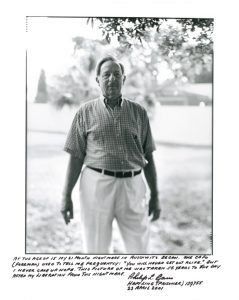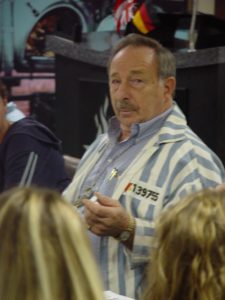The Florida Holocaust Museum is saddened by the recent passing of Philip L. Gans
The Florida Holocaust Museum is saddened by the recent passing of Holocaust Survivor Philip L. Gans.
Philip Gans was born in Amsterdam, Holland on January 23, 1928. His father owned a successful textile business and Philip was the youngest of three children.
Following the defeat of the Dutch and the subsequent occupation by German forces in 1940, it became dangerous to be a Jew in Holland. The Gans Family hid in many different cities and towns in Holland from July 1942 to July 1943 always seemingly one step ahead of the Germans. Luck ran out in the summer of 1943 when the German police arrested the family of five at a boarding house in the town of Santpoort. Efforts by the proprietor of the boarding house and friendly neighbors to hide them were ultimately unsuccessful.
After their capture, the family was sent to the Westerbork Detention Camp in the Netherlands for one month. In August of 1943, the Gans family was loaded into closed cattle cars and spent several days in miserable conditions en route to Auschwitz. Several days later they arrived in Auschwitz. When they arrived at Auschwitz, Philip’s mother and sister were immediately selected for gassing at Birkenau, while Philip, his brother, and father were selected to perform slave labor at Auschwitz III, also known as Monowitz-Buna. Philip’s number was 139755.
Philip toiled for nearly two years as a slave-laborer at the Buna complex carrying 50lb bags of cement and transporting railroad tracks by hand among other work. In February of 1944, Philip’s brother Benjamin became ill and was gassed.
As the Russians neared the camp in January, 1945, Philip and many other prisoners were relocated by foot and by rail to Gleiwitz II, then Mauthausen, then Oranienburg, and finally Flossenberg. At Gleiwitz II, Philip and his father were separated. Levie Gans died soon after on a death march. Philip remained at Flossenberg until April 16, 1945 when he was again forced into a death march. Soon after, on April 23, 1945 Philip was liberated by American troops.
Philip learned English from American occupation troops while working in an army kitchen and assisted them as a translator. In November of 1945, he returned to Amsterdam where he was adopted by family friends. In 1946, Philip joined his Aunt, a Survivor, in Aruba, and later arrived in the U.S. in 1950. Philip served 21 months in the United States Army, married, and had children.
For obituary and service information, please visit: https://www.mossfeaster.com/obituaries/Philip-Gans/


